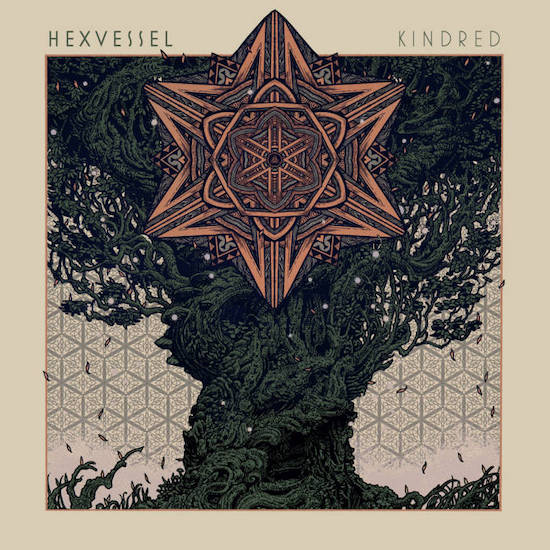Under normal circumstances, the phrase to wear one’s influences on one’s sleeves is a means of damning with faint praise, a way of saying that an artist is seriously unoriginal – but at least they have good taste. However, every so often a record comes out that is steeped in an avalanche of recognisable sounds, references that would in other hands become derivative, but somehow achieves the unlikely feat of being totally arresting. Kindred, the latest opus from Finnish psych-folk outfit Hexvessel, is one such album.
Such a successful distillation of influences is surely the result of experience, practice, and a damned inquisitive mind, seemingly that of lead singer Mathew ‘Kvohst’ McNerney. Under McNerney’s guiding hand, driven by his esoteric lyrics and shapeshifting vocals, a crack team of deeply learned heavy psych musicians embark on a journey into the celestial realm that only lasts thirty-nine minutes but feels like it stretches much longer. It’s a realm of dark pagan gods, battles between good and evil, and blasted, forested landscapes. Ritual, mythology, mysticism and philosophy: all these themes familiar to fans of a certain strand of bleak folk-rock are present and correct. And yet they are there in a way that somehow manages to find surprises for the listener.
Take opener ‘Billion Year Old Being’. There are references to hunter gatherers of yore, to the protagonist’s name spoken on the wind and edifices made of bones. There are spindly acoustic guitar patterns at the start that merge into crushing martial drums and chanted vocals. Then, almost out the blue, the piece shifts and accelerates in a flurry of polyrhythms and whirling organ. The clear influence here is the coda on King Crimson’s ‘21st Century Schizoid Man’ – minus the sax – and it could have been an incongruous addition amid such a grave pagan folk context. But somehow it works – perhaps because McNerney has zeroed in on the quasi-religious, folk-Christian imagery behind KC’s In the Court of the Crimson King and married it to his own brand of rather serious spiritual reflections.
It feels apt writing this review on May Day because, for all Kindred’s occasional deployment of prog flourishes or Sabbath-style riffs (‘Demian’) and the slight forays into dramatic Nick Cave territory (the vocal on ‘Phaedra’ could almost be a tribute act), this is a folk album through and through. I know it’s known as ‘forest folk’, but really this album is part of a pan-European tradition that stretches back to the likes of Comus (‘Phaedra’ again) and even more obscure acts of the 60s and 70s folk-rock tradition such as Mr Fox, Sand, Alrune Rod, Trees, Jan Dukes de Grey and Pearls Before Swine (or more recent acts like Riharc Smiles and Tenhi) all the way through to, more than any other band, Current 93, whose influence is most palpable on tracks like the superlative ‘Bog Bodies’ and ‘Fire of the Mind’. Where Hexvessel show particular deftness is in the way that very European tradition is melded with American Appalachian styles (again, on ‘Bog Bodies’, plus tracks like ‘Sic Luceat Lux’) that evoke artists like Ben Weaver, Jesse Sykes and Crow Tongue. This is an album that takes the primordial essence of common human fear and maps it across a great many traditions.
While many moments on Kindred are heavy and noisy, above all it’s a fragile and brittle – even paranoid – reflection on both the past and the present, refracted through a wealth of pagan and religious reference points as if McNerney and co. were omnivorous cultural and spiritual magpies. Its most beautiful moments are the most placid ones, where the overt influences fall away or become irrelevant enough to let you bask in the strange sylvan swell of Hexvessel’s singular focus. Oh, and McNerney has a voice to send shivers through your core more than even Current 93’s David Tibet, as best displayed on the magnificent ‘Kindred Moon’. There may be a lot of influences at play on Kindred, but it always manages to rise above them.


